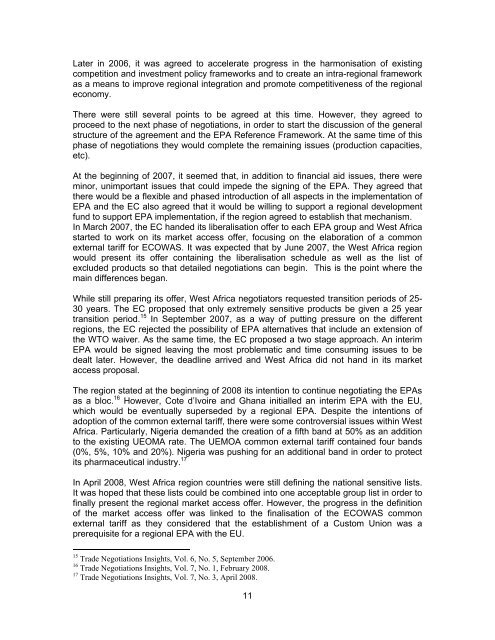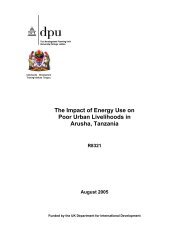EPA Review Annex Documents - DFID
EPA Review Annex Documents - DFID
EPA Review Annex Documents - DFID
You also want an ePaper? Increase the reach of your titles
YUMPU automatically turns print PDFs into web optimized ePapers that Google loves.
Later in 2006, it was agreed to accelerate progress in the harmonisation of existing<br />
competition and investment policy frameworks and to create an intra-regional framework<br />
as a means to improve regional integration and promote competitiveness of the regional<br />
economy.<br />
There were still several points to be agreed at this time. However, they agreed to<br />
proceed to the next phase of negotiations, in order to start the discussion of the general<br />
structure of the agreement and the <strong>EPA</strong> Reference Framework. At the same time of this<br />
phase of negotiations they would complete the remaining issues (production capacities,<br />
etc).<br />
At the beginning of 2007, it seemed that, in addition to financial aid issues, there were<br />
minor, unimportant issues that could impede the signing of the <strong>EPA</strong>. They agreed that<br />
there would be a flexible and phased introduction of all aspects in the implementation of<br />
<strong>EPA</strong> and the EC also agreed that it would be willing to support a regional development<br />
fund to support <strong>EPA</strong> implementation, if the region agreed to establish that mechanism.<br />
In March 2007, the EC handed its liberalisation offer to each <strong>EPA</strong> group and West Africa<br />
started to work on its market access offer, focusing on the elaboration of a common<br />
external tariff for ECOWAS. It was expected that by June 2007, the West Africa region<br />
would present its offer containing the liberalisation schedule as well as the list of<br />
excluded products so that detailed negotiations can begin. This is the point where the<br />
main differences began.<br />
While still preparing its offer, West Africa negotiators requested transition periods of 25-<br />
30 years. The EC proposed that only extremely sensitive products be given a 25 year<br />
transition period. 15 In September 2007, as a way of putting pressure on the different<br />
regions, the EC rejected the possibility of <strong>EPA</strong> alternatives that include an extension of<br />
the WTO waiver. As the same time, the EC proposed a two stage approach. An interim<br />
<strong>EPA</strong> would be signed leaving the most problematic and time consuming issues to be<br />
dealt later. However, the deadline arrived and West Africa did not hand in its market<br />
access proposal.<br />
The region stated at the beginning of 2008 its intention to continue negotiating the <strong>EPA</strong>s<br />
as a bloc. 16 However, Cote d’Ivoire and Ghana initialled an interim <strong>EPA</strong> with the EU,<br />
which would be eventually superseded by a regional <strong>EPA</strong>. Despite the intentions of<br />
adoption of the common external tariff, there were some controversial issues within West<br />
Africa. Particularly, Nigeria demanded the creation of a fifth band at 50% as an addition<br />
to the existing UEOMA rate. The UEMOA common external tariff contained four bands<br />
(0%, 5%, 10% and 20%). Nigeria was pushing for an additional band in order to protect<br />
its pharmaceutical industry. 17<br />
In April 2008, West Africa region countries were still defining the national sensitive lists.<br />
It was hoped that these lists could be combined into one acceptable group list in order to<br />
finally present the regional market access offer. However, the progress in the definition<br />
of the market access offer was linked to the finalisation of the ECOWAS common<br />
external tariff as they considered that the establishment of a Custom Union was a<br />
prerequisite for a regional <strong>EPA</strong> with the EU.<br />
15 Trade Negotiations Insights, Vol. 6, No. 5, September 2006.<br />
16 Trade Negotiations Insights, Vol. 7, No. 1, February 2008.<br />
17 Trade Negotiations Insights, Vol. 7, No. 3, April 2008.<br />
11
















